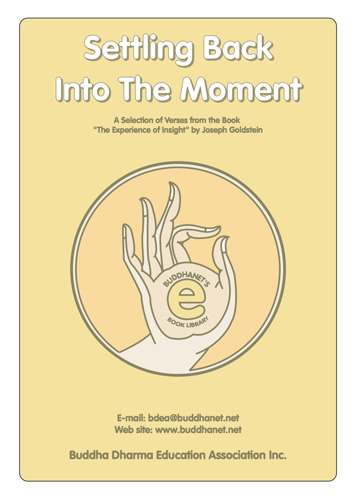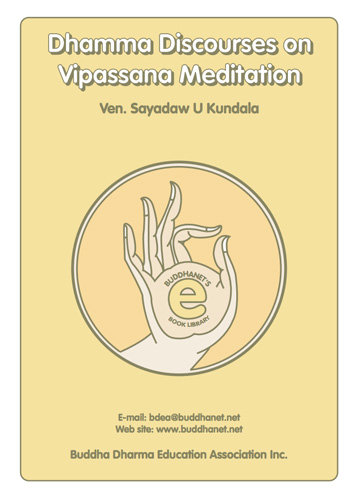 Top rated - Buddhist Meditation Top rated - Buddhist Meditation |

4sublime_states.pdfThe Four Sublime States5118 viewsVen. Nyanaponika Thera
Four sublime states of mind have been taught by the Buddha: Loving-kindness (metta), Compassion (karuna), Sympathetic Joy (mudita), Equanimity (upekkha) These four attitudes are said to be excellent or sublime because they are the right or ideal way of conduct towards living beings They provide, in fact, the answer to all situations arising from social contact. They are the great removers of tension, the great peacemakers in social conflict, and the great healers of wounds suffered in the struggle of existence. They level social barriers, build harmonious communities, awaken slumbering magnanimity long forgotten, revive joy and hope long abandoned, and promote human brotherhood against the forces of egotism.    
(8 votes)
|
|

allmetta.pdfLoving-kindness Meditation6309 viewsVen. Sujiva
Loving-kindness Meditation or Metta Bhavana and other Sublime States by Ven. Sujiva is a clear and comprehensive step-by-step explanation of the systematic practice. It is based on the Visuddhimagga or The Path of Purification by Buddhagosha. The texts describe metta as characterised by promoting the aspect of welfare. Amity, goodwill, friendliness and loving-kindness are some words used to describe this mental state. There is no better way to know it than to study it as it occurs in one's own and others' minds. It is a totally unselfish and pure state of mind that brings profit to oneself and others now and hereafter.    
(20 votes)
|
|

scrn_metta.pdfMetta Bhavana; Loving-kindness; Meditation3634 viewsVen. Dhammarakkhita
This is short explanation on how to practise Metta Bhavana or Loving-kindness Meditation given as a three-day weekend retreat at Dhammodaya Meditation Centre in Nakhon Pathom in Thailand, by an Australian monk, Ven. Dhammarakkhita (Jeff Oliver).    
(7 votes)
|
|

settleback.pdfSettling Back Into The Moment3614 viewsA selection of verses from the book 'Experience of Insight' , by Joseph Goldstein. This book belongs to a different genre, not a book in the sense of having a beginning and an end. It is a compilation of excerpts that stand alone in meaning whichever way your finger may flip open the page. Readers are strongly encouraged to read Joseph Goldstein's Experience of Insight - a simple and direct guide to Buddhist Meditation (Published by Shambala Publications, Inc.) from whose book this compilation is attributed.    
(6 votes)
|
|

hello_with_love.pdfHello - with Love & Other Meditations3287 viewsMaster Visuddhacara
The three most important things in life are love, kindness and wisdom. If we have made these three values the priorities of our life, then our life will have been well-lived. When we die we can only have happiness when we look back and not regrets. Wealth, fame, power, status, worldly success and pleasures - these are insignificant compared to love, kindness and wisdom. Cultivate the latter. If we spend our life cultivating this trio, our birth and life will have been worthwhile; it will not have been in vain. In this booklet, Ven. Visuddhacara shares his understanding of this practice of mindfulness and loving-kindness with a view to encourage all of us to walk the path.    
(8 votes)
|
|

seeding.pdfSeeding the Heart3079 viewsGregory Kramer
Loving-kindness Meditation with Children. The practice of loving-kindness, or metta, can be done in one of two ways: either in intensive prolonged meditation to develop deep states of concentration, or in daily life at any time one meets with people and animals or thinks about them. To learn about the radiating of metta to all beings with children, we have to tap into the store of knowledge accumulated by lay people and parents. It must be knowledge which has grown out of years of living and loving with children and young adults. Gregory Kramer, father of three boys, shows us here with what subtle but precise adjustments in the standard practice of loving-kindness he was able to anchor it in the lives of his children.    
(7 votes)
|
|

allkunda.pdfDiscourses on Vipassana Meditation9467 viewsSayadaw U Kundala is a renowned meditation master in the Mahasi Sayadaw tradition of Burma, noted for his loving-kindness. In these Dhamma talks the stages of the practice and the Insight Knowledges are explained. The method of meditation is given with detailed instruction. There is a detailed explanation of the Contemplation of Feelings, the second foundation of mindfulness, which, in the Theravada tradition, is the key to the Insight Knowledges. Overall, in the Sayadaw's teachings, there is much for the Vipassana or insight meditator to be inspired by.    
(15 votes)
|
|

chanmed1.pdfFundamentals of Ch'an Meditation Practice6082 viewsTing Chen, Tr. Master Lok To
The Fundamentals of (Ch'an) Meditation Practice by Ting Chen. Originally, one's own mind and nature are pure, and there is nothing to accept and nothing to refuse; there is neither existence nor nonexistence; there is only clear understanding without attachment and with no dwelling. One who wants to know the no-attachment, no-dwelling mind can find it through meditation, because it is only then that the mind does not think of right and wrong, of good and evil or of self and others.    
(17 votes)
|
|

02_contemplating_movement.pdf02 Contemplating Movement5059 viewsPatrick Kearney
Contemplating movement. Here we explore the nature of distraction and its relationship to the fact of change. This brings us to insight meditation, and incorporating movement into the practice. We begin walking meditation, and introduce the standing posture.    
(8 votes)
|
|

monkeym.pdfTaming the Monkey Mind3551 viewsCheng Wei-an. Tr. by Dharma Master Suddhisukha
Taming the Monkey Mind is a guide to Pure Land practice. It deals specifically with the main practice of the Pure Land School - Buddha Recitation - and covers both the noumenal and phenomenal aspects of that practice. The treatise is accompanied by the detailed commentary of an Elder Master of the Zen and Pure Land lineages. Readers not familiar with Pure Land theory may wish to begin with Dr. J.C. Cleary's introduction.    
(4 votes)
|
|
|
|
